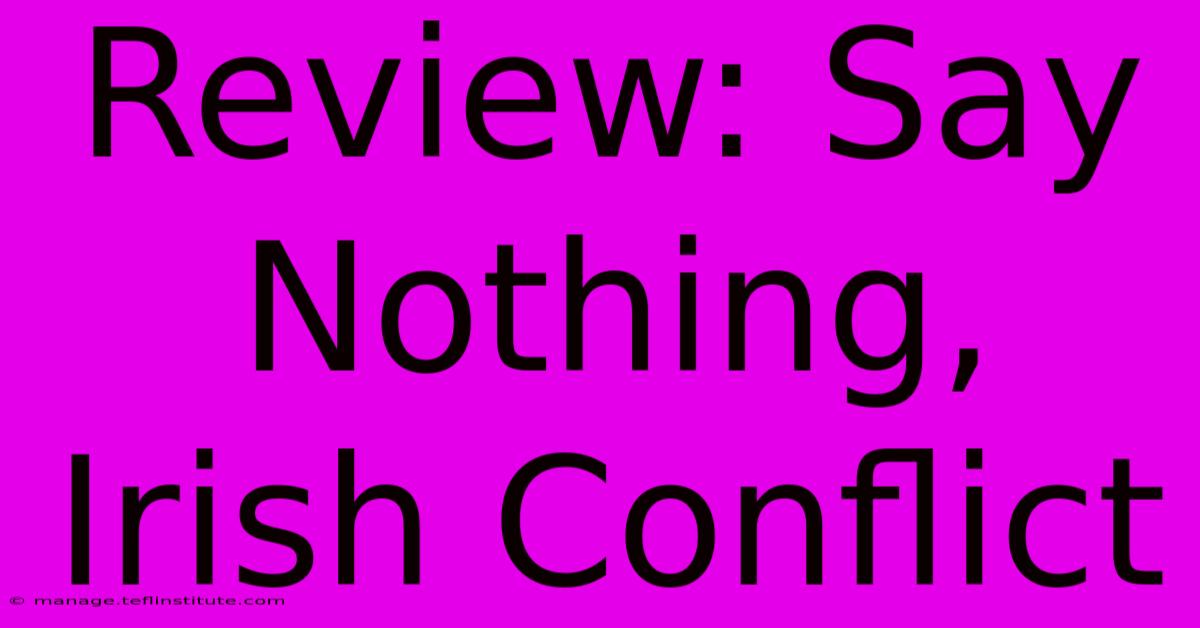Review: Say Nothing, Irish Conflict

Table of Contents
Say Nothing: A Chilling Exploration of the Troubles, Beyond the Headlines
Patrick Radden Keefe's Say Nothing: A True Story of Murder and Memory in Northern Ireland isn't just another book about the Troubles; it's a masterclass in investigative journalism, weaving together personal narratives and historical context to create a profoundly moving and unsettling portrait of a conflict that continues to haunt Ireland. Keefe meticulously reconstructs the abduction and murder of Jean McConville, a widowed mother of ten, by the Provisional IRA in 1972, using this singular event as a lens through which to examine the brutal realities of the conflict.
The strength of Say Nothing lies in its humanization of the conflict. While acknowledging the political complexities and ideological battles, Keefe focuses relentlessly on the individuals caught in the crossfire. McConville's story is heartbreaking, not just for its violence, but for the lasting trauma inflicted on her family, who spent decades searching for answers. Keefe skillfully interweaves her story with those of Gerry Adams, the former President of Sinn Féin, and Dolours Price, a prominent IRA member, both implicated in the McConville killing. He doesn't shy away from portraying the moral ambiguities inherent in the conflict, highlighting the agonizing choices faced by individuals caught between loyalty, ideology, and survival.
Keefe’s investigative prowess is undeniable. He employs meticulous research, unearthing previously unknown details and drawing on a wealth of interviews – some conducted over years – to build a compelling and nuanced narrative. He skillfully navigates the delicate balance between presenting evidence and allowing readers to draw their own conclusions, avoiding simplistic judgments. The book isn't afraid to challenge established narratives, forcing readers to confront the lasting psychological scars inflicted on both victims and perpetrators.
The structure of the book is expertly crafted. Keefe alternates between the McConville family's desperate search for their mother and the parallel narratives of Adams and Price, allowing the reader to experience the conflict from multiple perspectives. This approach avoids a simplistic "good guys versus bad guys" dichotomy, instead revealing the layers of betrayal, secrecy, and trauma that defined the era. The gradual unraveling of the truth, the persistent denial, and the devastating impact of the conflict on individuals and families are palpable throughout the narrative.
While the book is undoubtedly dense and detailed, Keefe's writing style remains accessible and engaging. He masterfully balances the historical context with the intimate details of individual lives, ensuring the reader remains captivated throughout the nearly 500 pages. He avoids sensationalism, preferring instead to let the raw facts speak for themselves, creating a truly powerful and unforgettable reading experience.
However, the book’s strength is also its potential weakness. The intense focus on a single event, while effective in illustrating the human cost of the conflict, may leave some readers wanting a broader overview of the Troubles. While the book does provide context, its primary focus remains on the McConville case and the individuals involved.
In conclusion, Say Nothing is a remarkable achievement in investigative journalism. It's a deeply moving, meticulously researched, and compelling account of the Troubles, offering a human perspective often overlooked in historical accounts. It's a book that will stay with you long after you finish reading, prompting reflection on the enduring legacy of violence and the complexities of seeking truth and reconciliation in the aftermath of conflict. It's essential reading for anyone seeking a deeper understanding of the Northern Irish conflict and its enduring impact.

Thank you for visiting our website wich cover about Review: Say Nothing, Irish Conflict. We hope the information provided has been useful to you. Feel free to contact us if you have any questions or need further assistance. See you next time and dont miss to bookmark.
Featured Posts
-
Say Nothing Finale Recap Key Moments 7 9
Nov 15, 2024
-
Bluesky Server Errors And Slow Performance
Nov 15, 2024
-
How To Watch Jake Paul Vs Tyson Weigh In
Nov 15, 2024
-
Bluesky Outage Can Platform Handle Growth
Nov 15, 2024
Latest Posts
-
Marselino Confidence Key For Indonesia Vs Japan
Nov 15, 2024
-
Marselino Urges Indonesia To Be Bold Vs Japan
Nov 15, 2024
-
Marselino Indonesia Needs Confidence Vs Japan
Nov 15, 2024
-
Indonesia Vs Japan World Cup Qualifiers
Nov 15, 2024
-
How To Watch Indonesia Vs Japan Today
Nov 15, 2024
-
Watch Indonesia Vs Japan Live Tv And Stream
Nov 15, 2024
